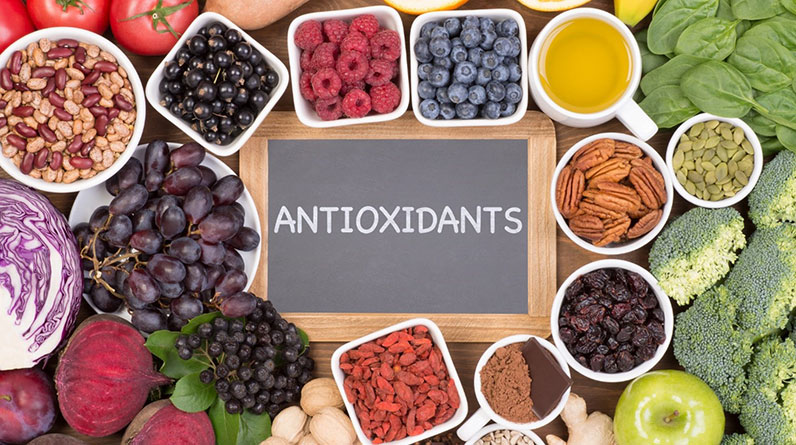
Antioxidants and Disease Prevention
Antioxidants are specialized compounds that protect our bodies from the damaging effects of free radicals. Free radicals are unstable molecules that are naturally produced by the body during metabolic processes, such as energy production, or introduced from external sources like pollution, cigarette smoke, or ultraviolet (UV) radiation.
When free radicals accumulate in the body, they cause oxidative stress, which can damage cells, proteins, and DNA. Over time, this oxidative stress is linked to the development of chronic diseases such as cancer, cardiovascular disease, neurodegenerative disorders, and premature aging.
Antioxidants help neutralize free radicals, preventing them from causing widespread cellular damage. They are found in various foods, particularly in fruits and vegetables, and include key nutrients like vitamins C and E, beta-carotene, and selenium.
By incorporating antioxidant-rich foods into our diet, we can help protect the body from oxidative damage and reduce disease risk. In what follows, we’ll discuss the function of antioxidants, how they prevent disease, and the best dietary sources to include for optimal health.
Role of Antioxidants in Disease Prevention
Antioxidants work to prevent disease by neutralizing harmful free radicals and reducing oxidative stress.
Consuming a diet rich in antioxidants can help protect the body from cellular damage and inflammation, thereby lowering the risk of developing conditions like heart disease, cancer, and neurodegenerative disorders.
Heart Disease
Oxidative stress is a significant factor in the development of cardiovascular diseases, such as atherosclerosis, where free radicals cause damage to the walls of arteries. This process can lead to the accumulation of plaque and inflammation, increasing the risk of heart attacks and strokes. Antioxidants, particularly vitamin C, vitamin E, and flavonoids, help prevent this oxidative damage by neutralizing free radicals and reducing inflammation within blood vessels.
Studies have shown that diets high in antioxidant-rich foods, such as fruits, vegetables, nuts, and whole grains, can improve heart health by lowering blood pressure, reducing bad cholesterol (LDL) oxidation, and improving blood vessel function. For instance, the Mediterranean diet, which emphasizes antioxidant-rich olive oil, fruits, and vegetables, has been linked to a lower incidence of heart disease.
Cancer
The link between oxidative stress and cancer is well established. Free radicals can damage DNA, leading to mutations that initiate the uncontrolled growth of cells, a hallmark of cancer development. Antioxidants help mitigate this risk by protecting DNA from oxidative damage and supporting the body’s natural defense mechanisms, including the immune system.
Specific antioxidants, such as beta-carotene (found in carrots and sweet potatoes), selenium (found in Brazil nuts and fish), and polyphenols (found in berries and green tea), have been shown to reduce the risk of certain cancers. For example, studies suggest that diets rich in fruits and vegetables may lower the risk of cancers such as lung, breast, and colon cancer. While antioxidant supplements alone have not shown strong evidence in preventing cancer, consuming them as part of a whole-food diet appears to have a protective effect.
Neurodegenerative Diseases
Neurodegenerative diseases, such as Alzheimer’s and Parkinson’s, are strongly linked to oxidative damage in the brain. The brain is particularly vulnerable to oxidative stress due to its high oxygen consumption and lipid-rich environment, which makes it more prone to free radical damage. Over time, oxidative stress contributes to the degeneration of neurons and the accumulation of toxic proteins, which are hallmarks of diseases like Alzheimer’s.
Antioxidants such as vitamin E, vitamin C, and polyphenols (found in green tea, berries, and dark chocolate) may protect brain cells from oxidative damage. These antioxidants help reduce inflammation and improve blood flow to the brain, potentially slowing cognitive decline and supporting brain health. Research suggests that diets rich in antioxidant-rich foods, like the Mediterranean and MIND diets, may be associated with a lower risk of Alzheimer’s and other neurodegenerative diseases.
Limitations and Risks of Antioxidants
While antioxidants are vital for protecting the body from oxidative stress and reducing the risk of chronic diseases, it is important to understand that more is not always better—especially when it comes to antioxidant supplements.
The following will discuss the limitations and risks associated with antioxidant intake, particularly regarding supplementation and the need to focus on a well-rounded diet as the best source of antioxidants.
Overconsumption of Antioxidant Supplements
Antioxidant supplements have become popular, with many people believing that taking large doses of these compounds can provide additional protection against disease. However, research has shown that excessive intake of antioxidant supplements, especially in the form of synthetic vitamins, may have negative effects on health.
Studies have indicated that high doses of vitamin E supplements may increase the risk of hemorrhagic stroke, while excessive beta-carotene supplementation has been linked to a higher risk of lung cancer in smokers.
One reason for these risks is that antioxidants can become “pro-oxidants” in high concentrations, meaning that instead of neutralizing free radicals, they may promote oxidative stress and lead to cellular damage. Excessive antioxidants from supplements may disrupt this balance, undermining their protective role and potentially causing harm.
The Need for Balanced Antioxidant Intake Through Diet
While antioxidant supplements can pose risks, the good news is that obtaining antioxidants from a balanced, nutrient-dense diet is both safe and beneficial. Whole foods, such as fruits, vegetables, nuts, seeds, and whole grains, provide a complex array of antioxidants in natural forms that work synergistically with other nutrients to promote optimal health.
Diets rich in naturally occurring antioxidants, like those found in berries, leafy greens, nuts, and legumes, provide enough to support the body’s defenses against oxidative stress without the risks associated with over-supplementation.
It’s important to remember that antioxidant-rich foods are part of a broader healthy eating pattern, not a cure-all or quick fix. Focusing on variety—eating different types of antioxidant-rich foods—ensures that you’re getting a wide range of beneficial compounds without overloading on any single antioxidant.
